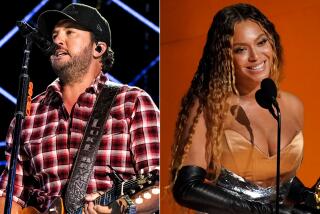Did Beyoncé just surprise-drop the best live album of all time?
If you were there — or if you just watched it on YouTube — then you know that Beyoncé’s performance at the 2018 Coachella festival may have been the greatest concert of our time.
A loving and deeply thought-through re-creation of a halftime show at a historically black college, Beychella (as it quickly became known) blew minds with the scale and audacity of its vision, and with the mastery of its execution.
Now, between the two weekends of this year’s festival, the singer has revisited her epic accomplishment in a Netflix documentary and an accompanying live album, both titled “Homecoming.”
If Beychella was the best concert of the last decade or two, does it follow that “Homecoming” is one of the greatest live albums ever? Our experts debate its claim to music history.
MIKAEL WOOD: One of the many ways of looking at “Homecoming,” which contains 40(!) tracks and appeared without warning early Wednesday on the major streaming services, is as a reaffirmation of that musty, vinyl-era artifact, the live album.
Live records once were big business. They offered artists the chance to show off what they could do outside a carefully controlled recording studio.
Think of “Live at Leeds,” which restored the Who’s explosive reputation following the theatrical “Tommy.” Or “Aretha Live at Fillmore West,” with Franklin’s radical reimagining of “Bridge Over Troubled Water.” Or “Cheap Trick at Budokan” or James Brown’s “Live at the Apollo” or even “Frampton Comes Alive!”
These days, of course, artists don’t need to make an album to preserve their concert work; that’s what Instagram and YouTube are for.
But as always, Beyoncé’s ambitions outstrip those of her peers. So here’s her attempt to break into the live-album canon — indeed, perhaps to dominate it.
SONAIYA KELLEY: Let me preface this by saying that, while I am a fan of Beyoncé, I’m not a diehard member of the Beyhive by any means. That being said, yes, “Homecoming” is one of the greatest live albums ever. If nothing else, the intention behind her performance makes it so.
During the opening two songs, her band plays melodies from ’90s Southern rappers C-Murder and Juvenile that are instantly recognizable to black listeners. There are also a few chords from the Emerald City scene in the Motown classic “The Wiz” that feel like a knowing wink. After years of maintaining a pop-star remove from political and social issues, Beyoncé now unapologetically embraces her blackness and takes every opportunity to celebrate the culture that has always championed her.
It can’t be overemphasized just how revolutionary it was for her to transform Coachella — a predominantly white festival —into an HBCU halftime show, to “swap out a flower crown” to bring “our culture” (as she says in the Netflix documentary). Beyoncé’s star wattage exceeds almost any other musical artist from the last decade, and still it took until 2018 for Coachella to book her as its first black female headliner.
RANDALL ROBERTS: This is certainly one of the biggest live albums ever released, both in terms of onstage participation and thematic breadth. Across the record, Beyoncé and her band riff on work by Nina Simone, Fela Kuti, Parliament-Funkadelic, Led Zeppelin, second-line New Orleans brass bands and heavy-hitting drumlines. Listening to it at full volume this morning was an overwhelming experience. So much action. So many cues and rhythms, so much narrative momentum. Its melodic and rhythmic quotes need footnotes to fully absorb, and her voice resonates with history.
Still, calling it the best live album of all time may be a stretch. Is this “better” than “Nina Simone at Newport,” Fela Kuti and the Africa 70’s “Live,” “Parliament Live” or “James Brown Live at the Apollo”? What about Aretha Franklin’s “Amazing Grace” or the Staple Singers’ “Freedom Highway”?
Hell if I know, but it ranks way, way up there.
MAKEDA EASTER: I agree with Sonaiya: Beyoncé’s “Homecoming” at Coachella was a revolutionary act. Performing such a black show in such a white space was a way to say to so many people, “I see you,” even if most people in the audience didn’t quite get it.
As someone from Houston, whose family is from Mississippi, I did get it. “Homecoming” is a way of saying my family’s culture has value.
While I didn’t attend an HBCU, both of my parents did. I grew up going to HBCU football games. I remember waiting in anticipation for the halftime show. To watch the drum major strut out and the band play soulful versions of my favorite songs. To see the beautiful black dancers in the stadium bleachers absolutely kill it. My cousin was a Jackson State University Prancing J-Sette (the innovators of the style of dancing seen at Beyoncé’s Coachella performance), which is still a source of pride for my family. “Homecoming” takes me back to that place. It makes me proud to be black. It makes me proud to be black and from the South.
This album is a piece of black history.
KELLEY: One of the songs that stands out the most to me is the bonus studio cover of Frankie Beverly & Maze’s “Before I Let Go.” That ’80s classic is absolutely treasured in the black community, providing the soundtrack for many of our fondest memories of celebration and togetherness. It’s the perfect addition to the album, and a timely reminder of Beychella’s message of black excellence.
WOOD: “Homecoming” is also the rare live album whose audience has likely already consumed — live, via YouTube or now on Netflix — the concert in question.
What it offers, in other words, is the pleasure of experiencing the show again — of being reminded of the shock and awe, but also of being able to savor the countless details that flew by you in real time.
Listening now, I’m amazed at the intricacy of the marching-band arrangements in “Sorry” and “Party” and the lushness of the vocal harmonies in “Say My Name”; indeed, the singing throughout is shockingly precise, given how much was happening around Beyoncé onstage.
ROBERTS: As the most successful and popular musician of her generation, the mere mention of Beyonce’s name prompts an avalanche of images and expectations. Unfortunately, her musicality is rarely at the front of the conversation. The genius of issuing “Homecoming” as a recording is that it strips away all the eye candy — the choreography, the fashion, the visual syncs — until what’s left is sound.
Cranking in your car, say, the transition from “I Been On” to “Drunk in Love” or the foot-stomping intro to “Party,” is an invitation to hear her as a consummate bandleader and musical scholar.
EASTER: I’m glad that Randall used the word “genius” to describe “Homecoming.” There are people who believe (and years ago I was one of them) that Beyoncé was a performer fabricated by a team of handlers, with little creative input into her own persona and product. That’s just not true.
There have been discussions about this before, but the word “genius” is so rarely used to describe women. Oxford defines genius as “exceptional intellectual or creative power or other natural ability.” So yeah, it’s fair to say that Beyoncé, and this work, is genius. I hope “Homecoming” cements that. And I hope we can start considering more women geniuses.
More to Read
The biggest entertainment stories
Get our big stories about Hollywood, film, television, music, arts, culture and more right in your inbox as soon as they publish.
You may occasionally receive promotional content from the Los Angeles Times.










